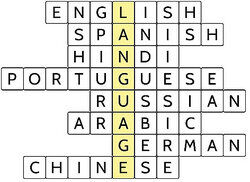Except where the litigants and witnesses are German, the Serbo-Croatian language is used.
The only exception was in the Italian districts; not only in Italy itself (in Lombardy, and afterwards in Venetia), but in South Tirol, Trieste, Istria and Dalmatia, Italian has always been used, even for the internal service of the government offices, and though the actual words of command are now given in German and the officers are obliged to know Serbo-Croatian it remains to this day the language of the Austrian navy.
A body of these Uskoks, as they were called, from a Serbo-Croatian word meaning "refugee," established itself in the Dalmatian fortress of Clissa, near Spalato, and thence waged continual war upon the Turks.
Along the Croatian and Dalmatian coast there existed a well-developed Latin civilization, which was sustained by constant intercourse with Italy; and, under its influence, the Serbo-Croatian immigrants were converted to the Roman Catholic Church.
For a full description of the cathedral, in Serbo-Croatian and French, see the finely illustrated folio Stolna Crkva u Djakovu, published by the South Slavonic Academy (Agram, 1900).





